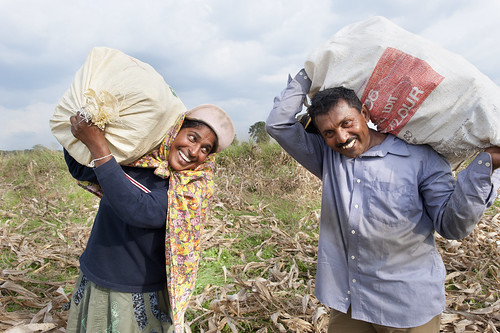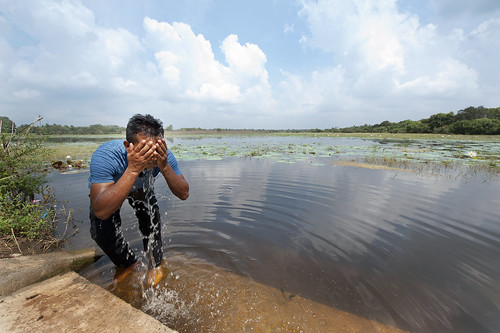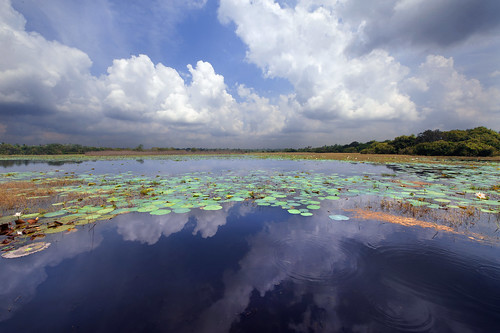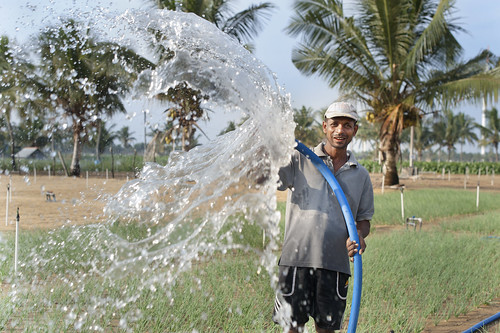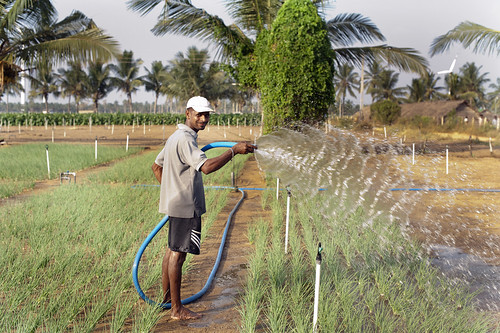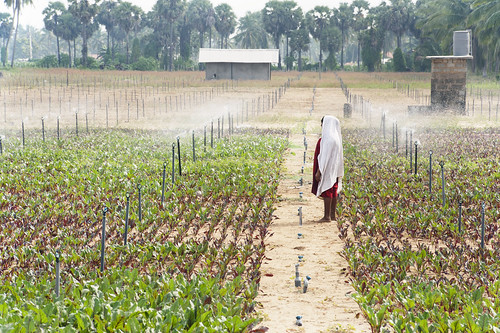Sri Lanka depends on monsoon rainfall as the primary source for its water resources; this is highly variable in space and time. Approximately
81% of the island’s population resides in rural areas and depends on agriculture for their livelihoods. Water scarcity in the country’s Dry Zone makes cultivation difficult for part of the year and is a major constraint to development. Climate change aggravates this water scarcity further: monsoons are more erratic and persistent droughts are common. Due to increased demands from agriculture, industry and urbanization, water resources are being rapidly depleted. The government has made a major effort to establish new water infrastructure, renovate existing dams and reservoirs, and promote improved irrigation technologies to meet the demand for agricultural water. Nevertheless, water-related challenges continue to increase, and Sri Lanka’s target to provide a piped water supply to 100% of the population is elusive at best.
Hundreds of years ago, people in Sri Lanka learned to manage rainfall variability by setting up cascading surface water tanks (locally called ‘
wewa’), the first of which was built in 450 BCE. Over millennia, cascade systems have supported people’s livelihoods and food security, becoming a focus of community life. Managed by local water associations, approximately 16,000 tanks of varying sizes provide water for one-third of the rice produced in the country today, despite being highly dilapidated. The government has mounted periodic attempts to rehabilitate the tanks, but on a piecemeal basis without due attention to the cultural importance of the cascade system and the relationship between the tanks. IWMI proposed an alternative: a holistic approach that focused on rehabilitating the cascade as an integrated hydrological, socioeconomic and ecological system. We developed guidelines for prioritizing the selection of tank cascades to be restored, paying close attention to the economic, social, ecological and governance systems within which they operate. This work also involved organizing workshops on hydrological and water allocation modeling for engineers from provincial irrigation departments.
IWMI has developed digital tools to assess environmental flow requirements, measure the performance of irrigation schemes and manage irrigation infrastructure. We use the Water Evaluation and Planning (WEAP) model and the Soil and Water Assessment Tool (SWAT) to assess water resources availability in the context of a changing climate and other drivers of change.
IWMI works closely with government agencies, including the department that provides the national focal point for the Ramsar Convention; we also serve on the National Wetland Steering Committee, providing advice on policy and action planning. IWMI conducts research and capacity building on ecosystem services assessment for urban planning, biodiversity conservation and the wise use of wetlands. The wetland management strategy focuses on empowering communities and other stakeholders to co-develop strategies for increasing resilience through wetlands and biodiversity conservation and use. IWMI provided technical support to Colombo city’s application for Wetland City Accreditation from the Ramsar Convention. In 2018, Colombo was the first capital city in the world to receive this award.
An increase in rainfall variability and the frequency of extreme weather events is a reality for nearly five million people who derive their livelihoods from rain-fed and irrigated farming in Sri Lanka. IWMI is a leader in the use of remote sensing data for flood and drought monitoring. We conduct fine-scale climate risk mapping and monitoring, using satellite data and digital modeling to inform policies and technologies for disaster preparedness and emergency response strategies. IWMI is pilot testing the concept of stand-alone flood index insurance and ‘bundled solutions’ (weather advisories, agronomic practices including drought- and flood-tolerant seeds, and index insurance) for rapid post-disaster recovery and enhancing resilience among smallholder farmers in the face of climate change-induced extreme weather events. We are developing an advanced early warning platform that uses digital technologies to guide organizations and governments on how best to reduce the impact of climate shocks on vulnerable people and their livelihoods; improve the effectiveness of emergency preparedness, response and recovery efforts; and reduce the humanitarian burden.
Only 2% of Sri Lanka’s domestic wastewater is treated in centralized sewage treatment plants; the remainder is treated in septic tanks or released into the ocean, where it pollutes the environment. Drawing on decades of experience with solid and liquid waste management, IWMI has developed guidelines and standards for treating and composting fecal sludge and other organic waste to create a safe, high-quality organic fertilizer. Based on well-defined business models, we provide advice to the
National Water Supply and Drainage Board and local authorities on how to improve the management of fecal sludge from on-site sanitation systems and ways to turn waste into a resource for agriculture.
About 30% of the food produced in Sri Lanka is wasted, squandering not only the food itself but also the resources used to produce, transform, store and distribute it. IWMI is working with the government and the Food and Agriculture Organization of the United Nations (FAO) to develop a national food waste prevention, reduction and management roadmap tailored for the country. The project contributes to a larger effort to improve the resilience of rural-urban food supply systems to climate change and other shocks, such as pandemics.
Chronic Kidney Disease of unknown etiology (CKDu) is a serious health challenge in Sri Lanka, where it causes illness and death, especially among rural, low-income people in the Dry Zone of the country. A connection between CKDu and the consumption of contaminated groundwater has long been suspected. IWMI investigated that connection by conducting surveys of households that were both affected and unaffected by CKDu. We found that the presence of fluoride and other ions in stagnant household well water could be a causative factor for the disease, although unlikely to be the main cause. Unaffected households were more likely to boil water from shallow wells before using it for drinking. We are currently analyzing the uptake of approaches to discourage people from drinking untreated groundwater in order to increase the effectiveness of such efforts. IWMI continues to work with the health authorities, the Presidential Task Force on CKDu, academics and affected communities to find causes and practical solutions to the disease.



